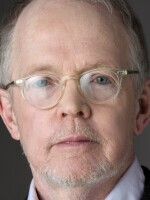Part 5 of a 6-part series
Let's say you're the mayor. It's your city, it's where you wake up. But are you thinking about Washington each morning, or do you zip out of the house in your mayor's outfit with your smartphone, and see what you can get done yourself?
If you're Wayne Seybold, the mayor of Marion, Ind., it's a bit of both.

The 47-year-old Republican is now in his second term. His city, in north-central Indiana, is home to 30,000 people who've been though a tough economy.
But now, on a drive-around in the mayor's car, you can see progress and promise.
'If We Don't Get A Starbucks, I'm Leaving'
A small example: Seybold's wife is from San Francisco, and she's been looking for a certain reassurance.
"You know, she'd tell me, 'If we don't get a Starbucks, I'm leaving.' So we went after Starbucks pretty hard, and there they are," he says, laughing. "[Now] it's one of the top performing stores in the region."
The town is happy that a Kohl's department store is on the way. In the grocery store, people see Seybold and say, "When are we gonna get a Target, Texas Roadhouse, Panera?"
Marion, Ind., believes brand names help bring factories. The mayor says it's a holistic approach to job creation.
"You know, it's so expensive to take your family to a sporting event, or to even a Broadway-type show, those types of things," he says. "A lot of us have replaced entertainment with eating out and shopping."
The next day at the mayor's house, his three young boys are there, along with Joey the dog and his wife, Jennifer. We watch a video of the 1988 Winter Olympic Games. Seybold skated in Calgary that year, paired with his sister. "That's about 35 pounds ago," he says, laughing.
After the Olympics, Seybold spent a few years putting ice shows together. Then he decided he wanted a small-town Indiana family life and moved back to Marion — he'd grown up here in a trailer park on the south side, the factory side of town.
It's here Seybold can show you where the new economic dream was born.
"It's probably one of the most blighted buildings we have in Marion today, and it's one of those old reminders of kind of where we were as a city," he says.
It's now a mostly empty, huge factory that once made tube television sets. Seybold was the new mayor in the spring of 2004, when the place shut down.
On that day, he says, 980 people lost their jobs. "They came to work and the doors were locked."
The mayor helped his city decide: It was time to go after new, diverse industries, by offering land and buildings almost free, and really paying attention to the companies you've already got.
When General Motors started laying off workers and turning off lights in several states, Seybold said, "Don't shut down your Marion stamping plant, and we'll get tax breaks to help you expand."
The doors stayed open, and the expansion meant 500 new jobs.
Cutting The Budget And Balancing The Books
Quite often in the City Hall conference rooms, you can hear Chinese. The men here on this day are in the furniture business. Seybold had first met them on one of his seven trips to China. Now, they're setting up in an old K-Mart building.
The mayor wants to sell and live in a city that is itself a good business model.
Marion's unemployment rate is down. So is the city payroll, down a hundred people — and that's by attrition. The mayor has cut the budget and balanced the books.
"We didn't have an IT department, now we do," he says. "We were doing all the trash, now we don't."
The IT folks found the city was paying for a hundred phone lines it didn't need. And the trash? Now it's privatized.
"We have 22 parks in our system. Well, we don't need 22 parks," he says. "[So] we're selling parks."
Selling parks, giving them away, so you won't have to go around and mow all that grass. The goal is five big parks — parks that people drive to.
"Years ago you had to have a different park in every neighborhood because people walked," says Seybold. "But it's a different world today, and I think that's what you have to do with the federal government."
As for Washington, Seybold wants sharper thinking and less regulation. But he has managed to put $4 million in federal dollars to good use: A new water system helped Marion attract $150 million in business development.
Copyright 2020 NPR. To see more, visit https://www.npr.org. 9(MDAxNDQ2NDAxMDEyNzU2NzM2ODA3ZGI1ZA001))




